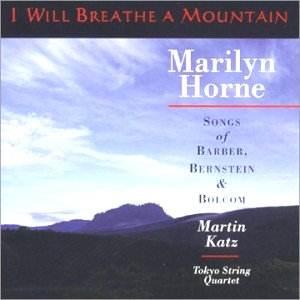The mezzo, Marilyn Horne, has enjoyed a varied and
illustrious career, particularly on the operatic stage where she has
been renowned particularly for her work in the bel canto repertoire.
On disc, at least, opportunities to hear her in recital have been more
rare and so this new CD is to be welcomed, particularly as the choice
of music is enterprising.
Performing with her long-standing recital partner,
Martin Katz (except in ‘Dover Beach’) Miss Horne gives a succession
of wholly involved and involving performances. In particular, without
ever overstepping the mark, she brings to these songs all the dramatic
range and fervour which comes from a lifetime’s experience on the stage.
She has a fabulous technique, which the Bolcom songs in particular exploit
to the full, and though the earliest of these recordings was made when
she was 64 there is little or no sign of wear in the voice.
The informative notes point out that Leonard Bernstein
actually wrote surprisingly few art songs. He is represented here by
items from a variety of sources, including two of his less successful
shows. Even in the items which are not directly derived from musicals,
Broadway is never too far away, one feels. Bernstein wore his heart
on his sleeve pretty consistently, both as a composer and performer,
and all the items here communicate directly with the listener. The vivid
communication is intensified by Horne’s performances. She is especially
moving in ‘What Lips my Lips have Kissed’ from Songfest (1976),
a piece apparently conceived with her voice in mind.
I have listened several times now to the Bolcom songs
and still can’t make up my mind about them. They were written to mark
the centenary of Carnegie Hall and specifically for Marilyn Horne to
sing. She asked for a cycle setting poems by women poets and helped
to make the choice of texts. Bolcom encompasses a wide variety of styles
in the cycle of 11 poems and is quoted in the notes as saying that "Each
poem pulls a different vocabulary out of me. I can’t do it in one style.
I need them all." This seems to me to be entirely reasonable and
valid but the wide range of styles is a bit disconcerting. At present,
the songs which I find the most effective are the more lyrical ones
such as ‘Never more will the Wind’ and the setting of Emily Dickinson’s
‘The Bustle in a House’, a text chosen by Marilyn Horne herself. Even
in the songs which don’t at present appeal to me so strongly the writing
is undeniably clever and effective and the songs are given virtuoso
performances by Horne and Katz (some of the piano writing sounds fearsome!).
This, I presume, is the first recording of the work and it is hard to
imagine that it could have been better served.
The disc opens with the Barber items and I don’t think
it’s just greater familiarity that makes me feel that these songs are
the best music in the collection. All the songs here come from Barber’s
early career and Miss Horne gives marvellous performances. She is majestic
and exalted in ‘A Nun takes the Veil’ and gives the most bitingly dramatic
account of ‘Bessie Bobtail’ that I have ever heard. For my money ‘Sure
on the Shining Night’ is one of the greatest of all twentieth century
songs and it receives a dedicated and eloquent performance here which
is fully worthy of the song.
I have never heard ‘Dover Beach’ sung by any other
kind of voice apart from a baritone but here Marilyn Horne, with distinguished
accompaniment by the Tokyo Quartet, fully vindicates its inclusion in
her programme. She sings it, as she sings everything else in the recital,
with a consummate care for the words and with rich tone.
A most stimulating disc, containing some first class
performances. Warmly recommended.
John Quinn

![]() Marilyn Horne (mezzo soprano);
Martin Katz (piano); *The Tokyo String Quartet
Marilyn Horne (mezzo soprano);
Martin Katz (piano); *The Tokyo String Quartet ![]() RCA Red Seal 09026 68771-2
[68.04]
RCA Red Seal 09026 68771-2
[68.04]